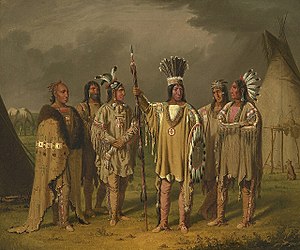
Back Qara ayaqlar Azerbaijani Чарнаногія Byelorussian Чернокраки Bulgarian Confederació blackfoot Catalan Mo'ôhtávêhahtátaneo'o CHY Černonožci Czech Blackfoot Danish Blackfoot German Μπλάκφουτ Greek Nigrapieduloj Esperanto
 Flag of the Blackfoot Confederacy | |
 Six chiefs of the Blackfoot Confederacy in 1859 | |
| Type | Military alliance |
|---|---|
| Origins | Great Plains |
| Membership | |
Official language | Blackfoot language |
The Blackfoot Confederacy, Niitsitapi, or Siksikaitsitapi[1] (ᖹᐟᒧᐧᒣᑯ, meaning "the people" or "Blackfoot-speaking real people"[a]), is a historic collective name for linguistically related groups that make up the Blackfoot or Blackfeet people: the Siksika ("Blackfoot"), the Kainai or Blood ("Many Chiefs"), and two sections of the Peigan or Piikani ("Splotchy Robe") – the Northern Piikani (Aapátohsipikáni) and the Southern Piikani (Amskapi Piikani or Pikuni).[2] Broader definitions include groups such as the Tsúùtínà (Sarcee) and A'aninin (Gros Ventre) who spoke quite different languages but allied with or joined the Blackfoot Confederacy.
Historically, the member peoples of the Confederacy were nomadic bison hunters and trout fishermen, who ranged across large areas of the northern Great Plains of western North America, specifically the semi-arid shortgrass prairie ecological region. They followed the bison herds as they migrated between what are now the United States and Canada, as far north as the Bow River. In the first half of the 18th century, they acquired horses and firearms from white traders and their Cree and Assiniboine go-betweens. The Blackfoot used these to expand their territory at the expense of neighboring tribes.
Today, three Blackfoot First Nation band governments (the Siksika, Kainai, and Piikani Nations) reside in the Canadian province of Alberta, while the Blackfeet Nation is a federally recognized Native American tribe of Southern Piikani in Montana, United States. Additionally, the Gros Ventre are members of the federally recognized Fort Belknap Indian Community of the Fort Belknap Reservation of Montana in the United States and the Tsuutʼina Nation is a First Nation band government in Alberta, Canada.
- ^ Dempsey, Hugh A. "Blackfoot Confederacy". The Canadian Encyclopedia. Retrieved 22 July 2017.
- ^ McNeel, Jack (6 April 2017). "10 Things You Should Know about the Blackfeet Nation". Indian Country Media Network. Archived from the original on 5 February 2018. Retrieved 22 July 2017.
Cite error: There are <ref group=lower-alpha> tags or {{efn}} templates on this page, but the references will not show without a {{reflist|group=lower-alpha}} template or {{notelist}} template (see the help page).